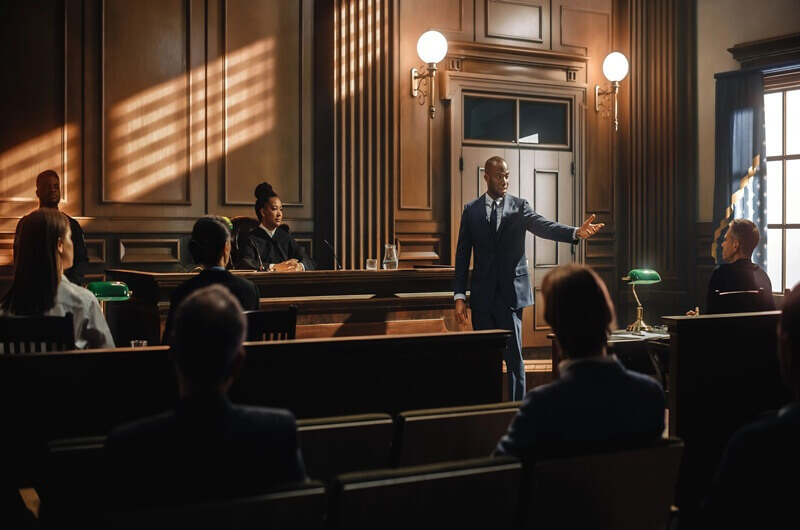Federal Attorney In Arlington Protects Your Rights & Future
Key Takeaways:
- Federal criminal charges can result in long prison sentences, steep fines, and lasting damage to your reputation, career, and future.
- Offenses that trigger federal prosecution include theft, financial crimes, violent offenses, firearm trafficking, drug trafficking, sex crimes, and RICO-related organized crime.
- These cases move quickly, follow strict federal procedures, and can involve aggressive prosecution.
- Having a knowledgeable federal attorney is essential to protect your rights and pursue the best possible outcome.
Facing a federal charge in Virginia is life-changing. A conviction can cost you your freedom, derail your career, and leave a permanent mark on your name. Prosecutors come prepared with powerful resources and little sympathy. That’s where an experienced federal attorney in Arlington comes in.
At The Irving Law Firm, we’ve defended clients against some of the toughest charges out there. Federal cases move fast, with complex rules and high stakes, but our team knows how to navigate the system and protect what matters most to you.
Today, we break down the kinds of crimes that can trigger federal prosecution in Virginia, how these cases differ from state charges, and what you can do right now to strengthen your defense. The sooner you understand the battlefield, the better we can help you stand your ground.
Different Types Of Federal Offenses
If you’ve been accused of a crime in Virginia, the terms and laws can feel overwhelming. In some cases, what starts as a state crime can also violate federal laws, Here are some of these offenses.
Theft & Financial Crimes
Theft is the unlawful taking of property with the intent to permanently deprive the rightful owner. In Virginia, this can involve acts such as shoplifting, burglary, stealing from a home or business, writing bad checks, identity theft, and embezzlement.
While many theft-related offenses are prosecuted under Virginia law, they can become federal crimes when they involve crossing state lines, targeting federal agencies, committing mail theft, or hacking federal systems. Other serious financial offenses, often involving deception or misuse of funds, can also lead to severe penalties, including significant fines, restitution, and prison time.
These financial crimes include:
- Money Laundering – Concealing the origin of illegally obtained funds by moving them through legitimate businesses or bank accounts.
- Counterfeiting – Producing, using, or distributing fake currency, government bonds, or official identification documents.
- Bribery – Offering, giving, or receiving something of value to influence the actions of a public official or decision-maker.
- Embezzlement – Stealing or misusing funds or property that has been entrusted to your care, often in a workplace setting.
- Identity Theft – Using someone else’s personal information without permission to commit fraud or other crimes.
Financial crimes can also escalate into federal cases if they cross state lines, involve federal agencies, or affect interstate commerce. Understanding the nature of these charges is the first step in preparing an effective defense strategy.
Violent Crimes
Violent crimes cover a wide range of offenses, from threats and intimidation to deadly attacks. Assault occurs when someone intentionally causes another person to fear imminent harm or attempts to inflict injury. It can range from simple assault to aggravated assault, which involves the use of a weapon or results in serious injury.
Other serious violent crimes include:
| Offense | What It Involves | Legal Considerations |
| Domestic Violence | Physical harm, threats, or abuse directed at a spouse, partner, or family member. | Includes physical assault, psychological abuse, and stalking; can be charged as a felony or misdemeanor. |
| Robbery with Force | Taking property from a person by using violence, threats, or intimidation. | Robbery involves direct confrontation and is classified as a violent crime. |
| Murder | Unlawfully causing the death of another person with intent or malice. | Includes first-degree, second-degree, and felony murder, each with varying degrees of intent. |
| Kidnapping | Unlawfully seizing, confining, or transporting a person against their will, often for ransom or coercion. | Becomes a federal offense if it crosses state lines or involves federal property. |
| Arson | Intentionally setting fire to property. | Classified as violent when it endangers or causes harm to people; federal charges apply if it affects federal property, interstate commerce, or public safety. |
Violent crimes can lead to some of the most severe penalties under both Virginia and federal law. When these cases involve federal jurisdiction, such as crimes on federal property, offenses crossing state lines, or organized criminal activity, the consequences can be even more severe, making a strong defense strategy essential.
Firearm & Weapons Offenses
Federal firearm laws are strict, and violations often lead to severe penalties. Firearm trafficking involves the illegal sale, transfer, or transportation of guns, often across state lines or to people prohibited from owning them. When these cases involve interstate commerce or organized criminal networks, they can be prosecuted in federal court. Convictions can mean lengthy prison terms, steep fines, and permanent loss of firearm rights.
Drug Crimes
These crimes range from simple possession to large-scale trafficking operations. Penalties increase with the type and quantity of the substance involved. Drug trafficking, especially when it spans multiple states, involves international smuggling, or connects to organized crime, falls squarely under federal jurisdiction. Federal drug prosecutions often carry mandatory minimum sentences, making these some of the most high-stakes cases a defendant can face.
Sex Crimes
Sex-related offenses carry some of the harshest legal and social consequences. These include rape, sexual assault, aggravated sexual battery, and indecent liberties with a minor. Crimes tied to sexually explicit materials, such as possession, distribution, transportation, or production of child pornography, are aggressively prosecuted under federal law, with severe mandatory prison terms. Convictions can result in lifetime sex offender registration, significantly impacting every area of a person’s life.
RICO & Organized Crime
The Racketeer Influenced and Corrupt Organizations Act (RICO) is a federal law designed to dismantle organized criminal enterprises. A RICO case occurs when prosecutors can show a pattern of illegal acts committed as part of an ongoing criminal organization. These acts can range from violent offenses like extortion, kidnapping, and murder-for-hire to non-violent crimes such as drug trafficking, money laundering, bribery, and fraud.
RICO charges are powerful tools for federal prosecutors because they allow multiple related crimes to be tied together under a single case. This means that even those who plan, manage, or profit from the criminal enterprise can face the same severe penalties as those carrying them out. Convictions for this crime can result in decades in federal prison, massive fines, and the forfeiture of assets connected to the criminal activity.
Sentencing & Penalties For Criminal Charges
If you’re facing criminal charges, it’s important to understand what’s at stake. Federal law divides crimes into felonies and misdemeanors, with each category broken down into classes that set maximum penalties. Judges rely on these classifications to determine the punishment in each case.
Misdemeanor Offenses
Not all federal crimes lead to decades in prison. Some are prosecuted as misdemeanors, which are less severe but still carry lasting consequences. A conviction can mean jail time, fines, probation, and a permanent criminal record. Federal misdemeanors are divided into three levels:
| Category | Maximum Penalty |
| Class A | Up to 1 year in federal prison and/or a fine up to $100,000 |
| Class B | Up to 6 months in prison and/or a fine of up to $5,000 |
| Class C | Up to 30 days in prison and/or a fine of up to $5,000 |
The exact sentence depends on the details of the case, the defendant’s history, and the federal sentencing guidelines. Even at the misdemeanor level, convictions can carry serious consequences that extend beyond fines or jail time.
Felony Offenses
Felonies are the most serious federal crimes and can result in long prison sentences, heavy fines, and lasting consequences. Federal law divides felonies into five classes, each defined by the maximum penalty allowed:
| Class | Maximum Penalty |
| Class A | Life in prison or death; fines up to $250,000 |
| Class B | 25 years or more in prison; fines up to $250,000 |
| Class C | More than 10 years but less than 25 years in prison; fines up to $250,000 |
| Class D | More than 5 years but less than 10 years in prison; fines up to $250,000 |
| Class E | More than 1 year but less than 5 years in prison; fines up to $250,000 |
Judges also apply the Federal Sentencing Guidelines, which consider the specific circumstances of the offense and the defendant’s criminal history. Some crimes carry mandatory minimum sentences, which judges cannot reduce.
Long-Term Repercussions
A guilty verdict extends beyond immediate penalties. Even after serving a sentence, individuals with a criminal record may encounter legal and social barriers that limit future opportunities.
- Limited Housing and Employment Opportunities: Landlords and employers commonly conduct background checks, making it difficult for individuals with convictions to find housing or jobs.
- Restrictions on Civil Rights: A felony conviction can lead to losing voting rights, firearm ownership, and jury service.
- Child Custody and Visitation: Family courts consider criminal records, particularly those involving violence or drug-related offenses, when determining custody and visitation rights.
- Immigration-Related Penalties: Non-citizens convicted of specific offenses risk deportation, visa denials, or restrictions on legal residency. In some cases, certain crimes automatically trigger removal proceedings.
The lingering effects of a conviction underscore the importance of a strong legal defense. Facing federal charges can be overwhelming, making it vital to understand how you can protect yourself against criminal prosecution.
How To Protect Yourself Against Criminal Prosecution
Getting arrested doesn’t automatically mean you’ll be convicted. The burden is on prosecutors to prove your guilt beyond a reasonable doubt, and you have the right to fight the charges. The key is knowing what to do and what not to do from the moment you’re arrested. Here are the steps you should take to protect yourself and strengthen your case:
Stay Calm & Remain Silent
Take a deep breath, keep your composure, and don’t panic. You have the constitutional right to stay silent; use it. Don’t answer questions or volunteer information; anything you say can and will be used against you in court.
Request An Attorney
Be clear and firm. Say you want a lawyer. Don’t discuss your case or answer questions until you’ve spoken with one. This is one of the most important ways to protect yourself from self-incrimination or police overreach.
Avoid Resisting Arrest
Even if you think the arrest is unjust, don’t argue, run, or fight back. Resisting arrest can lead to additional charges and make your situation worse. Cooperate physically, but don’t waive your rights.
Limit Conversations
Only speak about your case with your defense lawyer. Don’t talk to police, fellow inmates, or even friends or family about the details. Jailhouse conversations are often recorded, and even casual remarks can be used against you.
Take Mental Notes
Pay attention to everything: how officers treated you, what they said, and whether they followed proper procedures. Write down names, times, and any violations of your rights. These details can help your attorney challenge the charges later.
The decisions you make right after an arrest can shape your entire case. That’s why the sooner you talk to an attorney, the better they can protect you and start building your case.
Advantages Of Hiring A Federal Attorney In Arlington
Federal charges are serious, often more complex and more severe than state-level cases. Who you hire to represent you can change the outcome entirely. Our knowledgeable federal attorney can defend you in court and help you navigate the unique challenges of federal prosecutions.
Below are the key advantages of having an experienced federal lawyer in Arlington.
Strong Protection Of Your Rights Under Federal Law
Federal agents and prosecutors must follow strict rules, but they don’t always get it right. Unlawful searches, improperly executed warrants, and coerced statements can violate your constitutional rights. A federal attorney knows how to spot these violations and move to have illegally obtained evidence thrown out, weakening the government’s case against you.
A Defense Strategy That Fits Your Federal Case
Federal cases aren’t cookie-cutter, and neither are good defenses. Whether it’s a white-collar crime, drug trafficking, or conspiracy charge, your lawyer crafts a strategy that fits your circumstances. They dig into the evidence, challenge inconsistencies, and build a clear, persuasive narrative aimed at the best possible outcome for your situation.
Guidance Through The Federal Court Process
The federal system has its own set of deadlines, filing rules, and procedures, and they can be less forgiving than state courts. Missing a step can cost you dearly. A skilled federal attorney keeps everything on track, files motions properly, and ensures you meet every requirement, so you don’t lose on a technicality.
Tough, Effective Courtroom Advocacy
Federal trials are high-stakes and can be highly adversarial. Your attorney is your voice in the courtroom, questioning witnesses, challenging shaky evidence, and making compelling arguments to the judge and jury. In some cases, they can even discredit key pieces of the prosecution’s evidence, like flawed forensic reports or unreliable testimony.
Help Minimizing Long-Term Fallout
A federal conviction can follow you for life, making it harder to find work, keep professional licenses, or even travel freely. An experienced attorney works to reduce charges, negotiate alternative sentences, or even get the case dismissed if possible. We help you protect your reputation, livelihood, and freedom for the long haul.
Hiring a seasoned federal law firm in Arlington gives you a fighting chance against serious charges. Don’t face the federal system alone; the right lawyer is your best defense.
Your Future Deserves Relentless Protection
Facing serious criminal charges can have lasting effects on your life. The Irving Law Firm in Arlington, VA, provides skilled legal representation to help you understand your options and protect your rights throughout the legal process. A conviction can affect your freedom, career, and reputation, which is why having experienced attorneys who know both state and federal laws is essential.
Our team has handled a wide variety of cases, including theft, DUI, drug possession, sex crimes, and federal prosecutions. Federal cases often involve more complex procedures and higher stakes, and we work to address these challenges while pursuing the best possible outcome for our clients.
Every case is different, and so is every defense. Our team takes the time to hear your story and understand your priorities. Then we build a defense that fits your needs, whether that means challenging evidence, reducing penalties, seeking dismissal, or preparing for trial. At The Irving Law Firm, our focus is on protecting your rights and helping you move forward.
What Our Clients Say About Us
Our lawyers will represent you in family, business formation, criminal, personal injury, & estate planning matters.
They Are Top Notch
I arranged for Rachel Goldsher with this firm to handle my brother’s divorce. She and the firm’s staff were very responsive to his needs, and recommended a course of action that was reasonable and cost effective. Their billing was very reasonable, with paralegals and other staff handling much of the routine work and billing accordingly. As a result the overall cost of the divorce was reasonable. Rachel also effectively addressed my brother’s particular needs in the settlement agreement. I highly recommend.
I Highly Recommend
I arranged for Rachel Goldsher with this firm to handle my brother’s divorce. She and the firm’s staff were very responsive to his needs, and recommended a course of action that was reasonable and cost effective. Their billing was very reasonable, with paralegals and other staff handling much of the routine work and billing accordingly. As a result the overall cost of the divorce was reasonable. Rachel also effectively addressed my brother’s particular needs in the settlement agreement. I highly recommend.
I Highly Recommend Them
In a time of turmoil, the Irving Law Firm was there to answer my questions regarding a divorce. They do not try to gouge you and explain ways to make your divorce less stressful and pocket friendly. I highly recommend them.
I’d Definitely Hire Again If NeededRebecca and staff were wonderful handling my case. They seemed mindful of the billed time and I didn’t feel any was excessive. Her attention to detail brought me additional arrearages which a former attorney didn’t notice or enforce on prior filings. I’d definitely hire again if needed.
I Highly Recommend The Irving Law Firm To AnyoneMy experience with ms.Rachel Goldsher was nothing short of outstanding. She handled my case with the utmost professionalism and care. Her proactive approach was exceptional. I highly recommend THE IRVING LAW FIRM to anyone.
Excellent Results In Family & Criminal CasesExcellent results in family and criminal cases. I recommend the Irving law firm you will be satisfied. Thank you so much
Highly Recommend!!
Great support throughout the process and excellent results delivered. Highly recommend!!
We are on a mission at The Irving Law Firm to provide exceptional service and client satisfaction.




